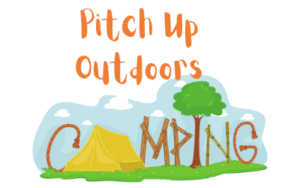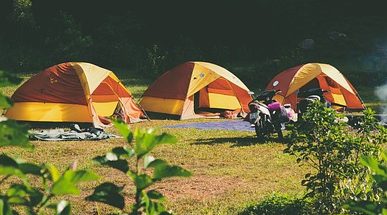This post contains affiliate links.
When camping, your want to enjoy some luxuries, but not all luxuries are worth taking. They can become more of a hindrance and spoil your holiday, especially if the items are bulky and expensive.
Camping is more about having fun, enjoying nature, travelling light, with only the main essentials.
Items to leave at home:
1 – Avoid floral scented perfumes and deoderants
We all want to smell nice wherever we are, but taking floral-scented items can turn into a nightmare. Floral scents attract gnats, bees and you will spend most of your holiday either running away from them or plastering yourself with repellants.
Leaving these items at home and not wearing floral scents will keep some bugs at bay. However, bugs are attracted to our natural body odour. So you cannot avoid it completly.
2 – Don’t use floral room sprays and candles
Tents can be a bit smelly, especially if everything is damp in the mornings. Plus, if you have kids, you can guarantee that you will be hunting for wet, smelly socks they have discarded somewhere.
It can be very tempting to spray your tent with a nice floral scent or have scented candles about. The main point here is that open flames inside your tent are dangerous. Spraying floral air fresheners will encourage bugs to pester you, plus the scent will ingrain itself into your tent. Depending on the spray can also destroy the natural water repellant.
If you want your tent to smell nice, you can use natural ingredients that will help remove unsavoury scents and help keep bugs away. Citrus fruits, gloves and food items like cucumber will keep gnats and bees away. Placing them on your picnic table or at the main entrance of your tent will save you any worries about waking up in the morning with bites. Or kept awake with the annoying buzzing sound.
Our article explains how everyday foods and simples steps you can take to avoid being annoyed by bugs.
3 – Expensive clothing you don’t want to ruin
Leave them at home if you are concerned about ripping your clothes or getting dirt on them. When camping, it is not always possible to keep your clothes clean or avoid tearing them as you are exploring.
In the morning, often your clothes will feel damp and may have a wet smell to them. To dry them, you will either lay them across your car bonnet or hang them from a tree branch in the sun. You don’t want to be worrying about how expensive your clothes are. Plus, they will not be insured if they are left outside drying.
Camping is normally living out of a rucksack, not hanging clothes in a wardrobe and worrying if they are creased.
Wear clothes that you do not mind if they get muddy or torn.
I will always take clothes that do not crease easily and are warm. I place dirty clothes in a plastic bag at the end of each day, ready to take home to clean.
4 – Leave designer shoes at home
Camping is about getting back to nature, walking and exploring your area. Having comfortable boots is a must and not worrying about them getting very muddy, which will happen. Leave expensive sandals trainers at home, and don’t even think about taking any heeled shoes with you, as you will not be able to walk safely and easily break the heel.
Walking boots cost quite a bit of money, and a good pair of walking boots is important. These would be the only expensive footwear that I suggest you take with you. However, make sure you have worn them in a bit first.
Take an old pair of trainers and something to place on your feet for showers or when you are inside your tent. Or maybe a thick pair of socks and some warm slippers. Something that will keep your feet warm and dry.
If your feet get cold or wet, you will feel cold, and it will take a while to warm up.
5 – Breakable plates and glassware

Things will get knocked over or dropped on the floor. Not only can they break during your camping trip but they can break easily during transport. Taking breakable glassware when camping is looking for trouble.
Trying to pick yo broken glass from a tent floor is a nightmare. Small fragments will be missed, which can not only hurt somebody but can also damage your tent.
Plates are not as bad as glassware as they do not shatter into small pieces. They are easier to pick up, but you can still easily cut yourself.
We have used rigid plastic plates in the past, but these mark easily and can be a nightmare to clean. To replace these, I purchased enamel plates and mugs. They are very hard-wearing; if they are dropped, they do not break. However, the prices range from £2 – £5 each. It can be a bit expensive to buy for larger numbers.
We have also replaced glassware with plastic cups. For about £10 you can buy a set of 6, various colours. Often sold with a jug, which is great for lunchtime or hot days when you are around the tent with kids.
6 – Lots of elaborate food: Buy local keep food simple
If you are camping for a week, don’t buy a weeks worth of food. Unless you have several good EHU cool boxes or do not mind storing some items in the campsites fridges or freezers. You will most probably end up throwing a lot of food away as it has gone off.
Only take the main essentials and no elaborate food. Keeping meals simple will take little prep work. Another alternative is to prepare food and freeze it before you leave. However, buying food locally will support the communities, or you can have food delivered.
Read more about how you can save money and reduce food waste. Plus, reduce the amount of food you have to transport for your camping trip.
7 – Large items that cannot be stored easily
Large times are not only bulky when travelling but not necessary. You will need some essential bulky items, such as a cool box, camping chairs, camp beds, cooking facilities, and tables. However, other items such as food containers, great for freezing food, suitcases are not really required.
Take disposable storage boxes with you, especially for food. Once you have used them, you can dispose of them correctly.
You don’t really need to take a suitcase either. You want to store clothes out of view; rucksacks are great for placing underneath your bed during the day if possible. In comparison, a suitcase is solid, large and not easy to store, although you could use it as a bedside table.
8 – Expensive electronic equipment
We all love our gadgets and can often feel lost without them. However, when you are camping, it is advisable to take items that you can store easily in your car for safety. Or items that you can put into your rucksack and keep with you during the day and beside your bed a night.
Items are rarely stolen from a tent, and I have never had it happen. However, I would not want to risk camping with my laptop. Or a large TV, just for a few hours entertainment during the evening.
Take a portable TV that can be kept in the boot of your car or a travel DVD player for the kids. Another option is a projector that connects to your phone to stream movies in the evenings.
We only take our mobile phones and iPad. On the iPad, we download movies before our camping trip. It can be stored safely in our car if we are out and about. Plus, Nick can snuggle in his sleeping bag and watch movies with headphones, so he does not disturb other campers if it is late at night.
9 – High amp electronic items
Taking items camping that uses high wattage will trip the EHU supply on-site. Each unit has either a 10 Amp or 16 Amp supply. Everyday items from home such as kettles, microwaves, toasters, or mini-fridges can be exchanged for travel items. They have lower wattage, and you will not have to keep resetting your electrics.
Try using your gas stove, firepit or BBQ facilities as much as possible, for boiling water and cooking. It adds more fun to camping, rather than relying on electricity.
I miss my hair straighteners, hairdryers, and many other items when I am camping. However, I never take them camping with me. I can use them in the shower blocks if I take them.
I have noticed that some camping sites have wired in hair dryers. So it is worth checking out when you are booking.
If you want to take some personal items, you can work out the wattage per unit and calculate what can be used simultaneously. Check out our article about how to get electricity to your tent, which provides the calculation for everyday camping items.
Key Takeaways
- If it is expensive leave it at home
- Only take essential items that are easy to transport
- Leave floral smelling purfumes and deoderants at home, use natural everyday items
- Leave glassware at home, very breakable and can damage your tent


